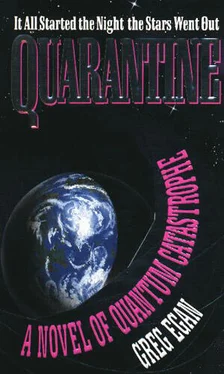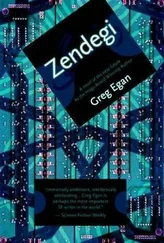She laughs uneasily; she seems almost embarrassed — the way some people become when recounting news of a disaster or atrocity.
'It's not easy to come to terms with, but that's what we are. We're not just the universe "knowing itself — we're the universe decimating itself, in the very act of gaining that knowledge.'
I stare at her, disbelieving. 'What are you saying? That the first animal on Earth with this trait… collapsed the whole universe?'
She shrugs. 'Maybe it wasn't on Earth, but there's no reason why it can't have been. Somebody had to be first. And not quite the whole universe — one casual glance at the night sky would hardly have measured everything. It would have thinned out the possibilities considerably, though — fixed the Earth and the sun, for a start: condensed them out of the mixture of all possible arrangements of matter that might have occupied the solar system. Fixed the brightest stars to within the acuity of this creature's vision, discarding all the alternative possible configurations. Think of the constellations that might have been; the stars and the worlds that vanished forever when this ancestor of ours opened its eyes.'
I shake my head. 'You can't be serious.'
'I am.'
'I don't believe you. What evidence is there? From one little experiment with silver ions, you're claiming that this hypothetical ancestor of humans — and possibly cats — transformed some kind of grand, glorious mixture of every possible universe that might have happened since the Big Bang… into whatever minuscule fraction of that would give this creature a single view of the night sky? Obliterating all the rest? Committing a kind of … cosmological genocide?'
'Yes. Maybe literal genocide. Life — intelligent life — need not collapse the wave function. If there was life before us which didn't collapse the wave, then we would have collapsed it. Which might have meant obliterating entire civilizations.'
'And you think we're still doing it? Collapsing things light years away? Other stars? Other galaxies? Other forms of life? "Thinning out the possibilities?" Hacking away at the universe — just by observing it?'
I laugh, suddenly remembering. 'Or rather, we were, until — '
I stop myself mid-sentence, and close my eyes for a moment, giddy and claustrophobic. The unspoken conclusion unfolds in my brain regardless, and no mod in my skull seems able to render it harmless.
Po-kwai says softly. 'Yeah. We were. Until The Bubble.'
After a morning in the ion room, confirming that the previous night's results were no fluke, Po-kwai is given a fortnight to rest while preparations are made for the next phase of the experiment. Being confined to the building doesn't seem to bother her; she spends most of her time reading. 'It's what I'd be doing anyway,' she says. 'And if I can forget that I don't have any choice, the whole situation is perfect: peace and quiet — and reliable airconditioning. That's my idea of heaven.'
The chant vanishes from my dreams. P3functions perfectly. Karen does not return. I ask Lee Hing-cheung, circumspectly, about his own mods. It turns out that he has only Sentinel, MetaDossier and RedNet — and apart from the original problem during the ion experiments, he's had no trouble with any of them. My determination to uncover the cause of my own mods' erratic performance fades; I can't see the point in presenting myself to a doctor or neurotechnician when I have no symptoms — and I'm reluctant to risk disclosing the fact that I have a loyalty mod to people who aren't meant to know. I promise myself to seek help at the first sign of dysfunction, but as each day passes with no relapse, the hope that the problem has 'cured itself seems less and less unreasonable.
Having feared some ingenious, but ultimately mundane, explanation for Laura's 'telekinesis' — having dreaded the burden of one more contradiction, one more disparity between my feelings about the Ensemble and the truth about its activities — Po-kwai's revelations are more than I could have hoped for. The Ensemble is probing the deepest questions of the nature of reality, the nature of humanity — and, possibly, the reasons for The Bubble as well. It fills me with shame to recall that I seriously entertained the notion that the sole purpose of this grand alliance might have been the grubby exploitation of Laura's escapological skills. I should have known it was something higher.
But if it had been 'grubby exploitation', after all? The Ensemble would have remained the most important thing in my life; the loyalty mod guarantees that. Fearing disillusionment and rejoicing in the affirmation of my faith are equally absurd. I spin this observation in my head, but it leads nowhere.
I find Po-kwai's staggering contention — that life on Earth might be intrinsically inimical to the rest of the universe — equally intractable. The notion that humanity is, or was, part of a kind of cosmic necrosis, depleting the universe of possibilities, committing inadvertent genocide on a scale beyond comprehension, is easy enough to hold in the mind — to state as an isolated, abstract proposition — but impossible to pursue. My sense of horror rapidly gives way to disbelief; I feel like I've been led through one of those bogus mathematical 'proofs' which claim to demonstrate that one is equal to zero. I back out of this mental cul-de-sac and hunt for a flaw in the argument. When I come on duty in the late afternoon, Po-kwai breaks off her reading, and we resume the debate.
I say, 'You've admitted, yourself: it's ludicrously geocentric'
She shrugs. 'Only if we were the first. Maybe we weren't; maybe it happened on a thousand other planets, a billion years before it happened on Earth. I don't expect we'll ever know. But having pinned down the parts of the human brain which collapse the wave function, what would be geocentric would be assuming that every other sentient creature in the universe does exactly the same thing.'
'But I'm not convinced that you have pinned it down. You haven't proved, conclusively, that you're not still collapsing the wave; you've only shown that the mod intervenes before the collapse — whatever causes it. Maybe one of the old theories is right, after all — maybe the wave collapses whenever the system gets large enough, but the mod manages to act on a length scale just below the critical size… it squeezes in its interference trick at the last opportunity.'
'Then what about the parts of the brain that the mod disables? What's going on there?'
'I don't know. But if they look like they're "designed" to have some quantum effect, then maybe they're a crude attempt to do the very thing that the eigenstate part of the mod does — influence the way the wave collapses, rather than just accept the raw probabilities. Maybe evolution has given us all a small capacity to nudge the odds; you can't deny that that would have some survival value. And if the wave function has always been collapsing at random, whenever the system grew large enough, ever since the universe began … then all we're guilty of is beginning to evolve some control over the process.'
She's sympathetic, but unmoved. 'If I don't invoke the collapse-inhibition part of the mod — if I don't disable those natural pathways — the whole effect disappears; the ions revert to randomness. That's the first thing we tested, the morning after the successful run. Okay, your theory might still be right — the natural pathways could interfere somehow with the mod's effects on the eigenstates, even if they had nothing to do with collapsing the wave. But if people had some capacity to "nudge the odds", I think it would have been discovered by now. I don't doubt that there are other explanations for the ion experiment — but what about The Bubble?'
Читать дальше










